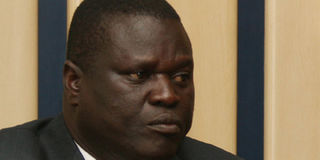Police investigating media drug claims

Internal Security assistant minister Orwa Ojode said police are investigating media reports of alleged cover-up in government ranks in relation to the country’s drug-trafficking menace November 9, 2011. FILE
Kenya Police are investigating media reports of alleged cover-up in government ranks in relation to the country’s drug-trafficking menace.
Internal Security assistant minister Orwa Ojode said the police had set up a committee to unearth the truth in the media reports.
Mr Ojode made the statement in Parliament Wednesday after MPs Benjamin Washiali (Mumias) and Rachel Shebesh (nominated) told him that the investigative pieces aired on KTN, a local television station, had exposed an intricate web of corruption and cover-up within the police force.
Ms Shebesh told Mr Ojode to own up regarding the possibility that the police were compromised by the drug cartels.
The assistant minister said the journalists “were reporting whatever they can get” and so the committee had been set up to determine the veracity of the media reports.
They asked the minister to shed light on the controversial death of a senior police officer Erastus Chemurei, who was killed by his colleagues in 2005 and then branded a gangster. The MPs linked his death to narcotics investigations, but Mr Ojode asked them to wait for the findings of the committee.
However, he did not disclose the membership of the committee and the timelines -- when the work begins and when the final report is expected.
The reports pointed fingers at some senior police officers for killing their colleagues who were fighting the drug cartels.
“Can the minister be real and tell us whether the government is under the control of drug cartels?” posed Ms Martha Karua (Gichugu). She said the majority of police officers in Coast Province ought to be transferred because they were in bed with drug-traffickers.
Mr Ojode said the government was still working on a final report. He noted that the conclusion of the report will take time, because of the complex nature of the drug-trafficking cartels.
“It is not something that can be concluded tomorrow. Let the police do their job. By the time we have evidence, we’ll arrest the culprits and take them to court,” said Mr Ojode. “We’re not going to leave anyone who does anything that is contrary to our Constitution and our laws; we’ll arrest you.”
The MPs sought to know if the naming of their colleagues in the House was just a red herring to throw investigators off the track of the real drug barons.
Mr Ojode said that the mentioning of the names of the MPs and the businessman in Parliament in relation to drug trafficking was as a result of a complaint from the former US ambassador Michael Ranneberger. He declined to apologise and said that they were not off-the-hook yet, until after the police conclude the investigations.
“There’s no need of an apology right now, because we don’t know what the final report will carry. It is not possible for me to apologise. We apologise to who, and for what?” Mr Ojode posed.




